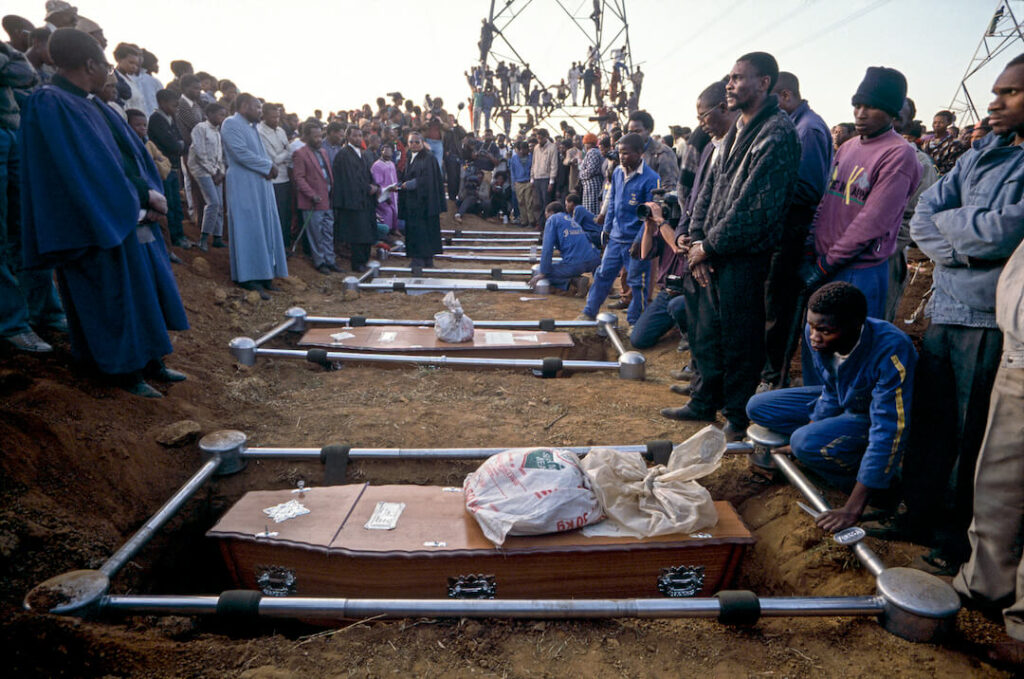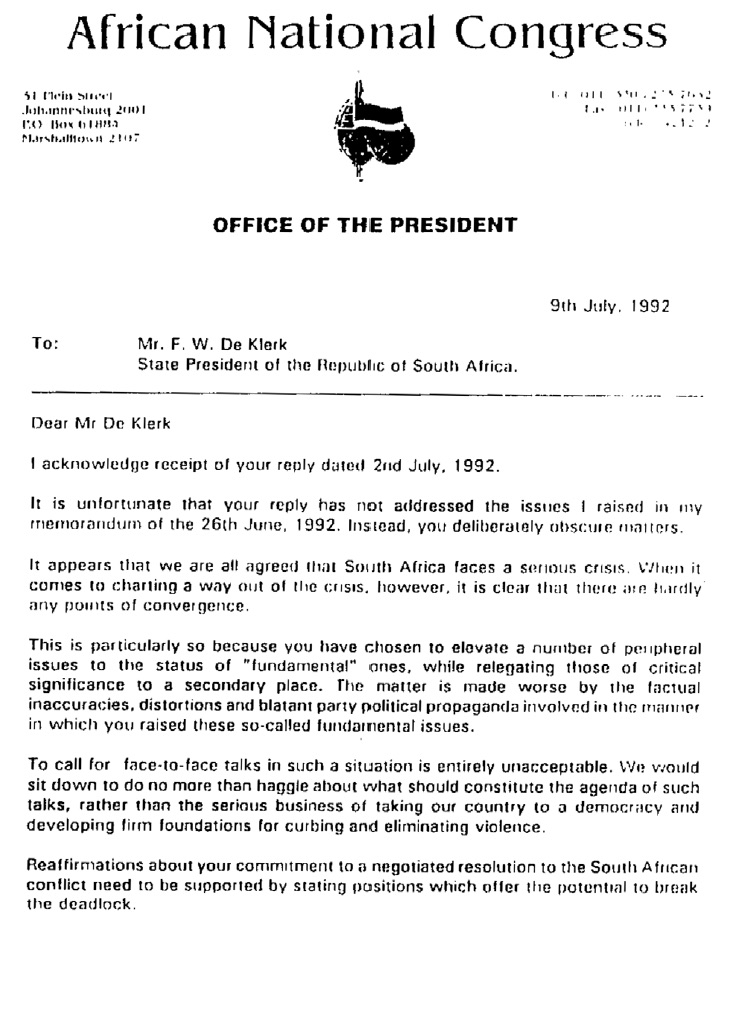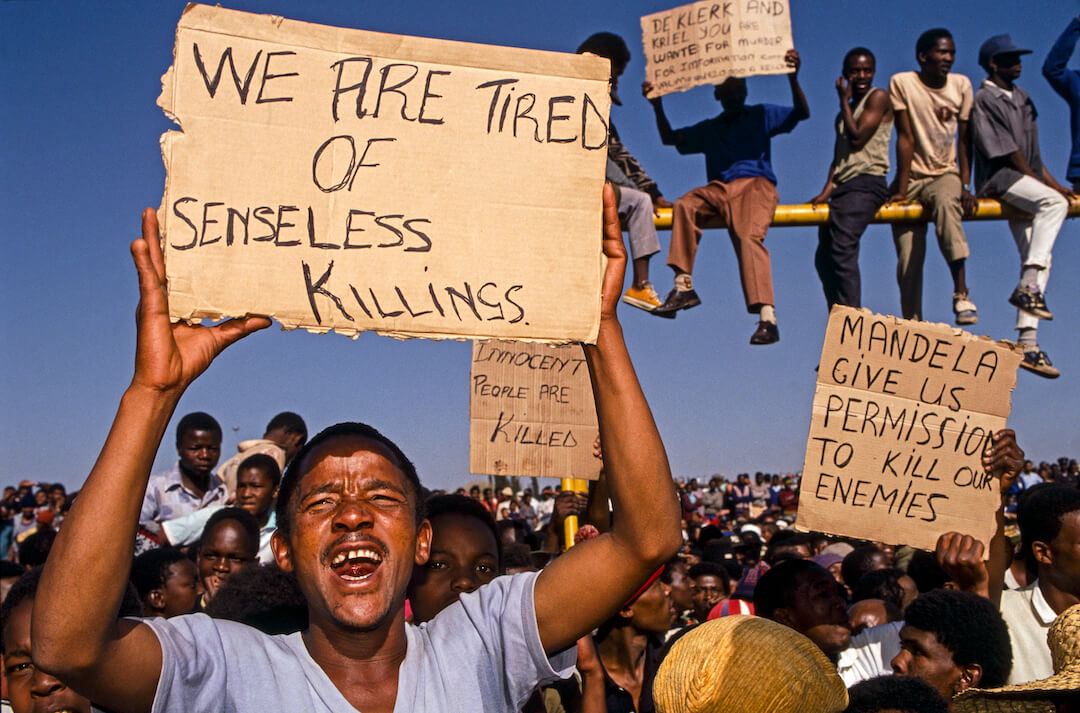Events after the Boipatong Massacre
17 JUNE 1992

Louise Gubb
The day after the
massacre – shell shock:
The streets of Boipatong resembled a battle zone. Angry ANC comrades set up barricades made of boulders and burnt-out tyres and dug trenches to trap Casspirs at every street corner. A heavy presence of police and soldiers patrolled the township. By midday, comrades had set alight the houses of a policeman and an IFP member. Police continued to remove bodies from houses and shacks around the township. Two hundred policemen, reinforced by SADF troops in 51 armoured vehicles, sealed off the KwaMadala hostel. No one was allowed to enter or leave. Themba Khoza, leader of the IFP’s Central Committee, condemned the confinement of residents as a ‘denial of the people’s civil rights’.
In the
following days:
Many political and church leaders visited the survivors of the massacre, including Mandela, Ramaphosa, and Archbishop Desmond Tutu. Many tears were shed.
Breaking off
negotiations:
Relations between De Klerk and Mandela reached an all-time low. Mandela sent De Klerk a letter accusing him of being complicit in the violence. De Klerk requested a meeting. Mandela refused, stating that meeting with De Klerk ‘would mean that we had something to talk about, which we do not’. On 23 June 1992, Ramaphosa as Chair of the ANC’s Negotiations Commission, announced that the ANC alliance was officially breaking off negotiations, accusing the government of ‘a cold-blooded strategy of state terrorism’.
Alliance
demands:
Three days later, Mandela sent De Klerk a strongly worded memorandum, setting out the ANC alliance’s 14 demands for the resumption of talks. It called for the termination of covert operations, including hit squad activity; the repeal of repressive legislation; the suspension of security force officials involved in the violence; the phasing out of hostels for migrant workers; and a ban on the carrying of dangerous weapons in public. The last two demands were at the core of rank-and-file ANC frustrations. Mandela repeatedly refused De Klerk’s requests to conduct ‘face-to-face’ talks, stating that a meeting was ‘entirely unacceptable’ in the circumstances. NP statements from this period were characterised by increasingly undermining attacks on the ANC.
The UN Security
Council:
In mid-July, the UN Security Council convened an unprecedented two-day debate on South Africa in an attempt to break the deadlock. This led to the appointment of a Special Representative of the Secretary-General, Cyrus Vance, to investigate the violence and make recommendations on restarting talks. A 50-member UN observer mission was also created to lend support to the National Peace Accord (NPA) structures. With the collapse of CODESA, the NPA was now the only official forum that provided space for parties to meet.
Aftermath:
The Boipatong Massacre proved to be a turning point in South Africa’s history – just as the Sharpeville massacre had been 32 years earlier. It changed De Klerk’s status forever, and Mandela took on the mantle of leadership of the country. The NP became a pariah in the townships.
In their own words
“Allegations that the hostel dwellers were involved in the attacks is irresponsible, especially in the light of the increasingly volatile climate sparked by the ANC’s mass action campaign.”
-Themba Khoza, then leader of the IFP Central Committee
“The general perception among black people was that the authorities knew of the attacks in advance and … the police took no action … and the military actually participated in the attacks. All this worked against De Klerk, diminishing his authority and credibility … the way in which he went to mourn in that township and how he behaved when he had been expelled, proved a very poor public relations’ exercise.”
–Fatima Meer, professor of sociology, author and activist
“The ANC is committed to negotiations only to the extent that its own objectives are served … The organisation is using extremely coercive negotiation tactics, including ultimatums, deadlocks, threats, reneging on agreements.”
-Extract from the NP statement in response the massacre
“After Boipatong, there were those in the ANC NEC who said, ‘Why did we abandon the armed struggle? We should abandon negotiations instead’ … I was initially sympathetic to the group of hard-liners, but gradually realised that … I would not turn my back on negotiations. But it was time to cool things down. Mass action in this case was a middle course between armed struggle and negotiations. The people must have an outlet for their anger and frustration.”
–Nelson Mandela, in his biography, Long Walk to Freedom
“They were so lucky that the massacre at Boipatong happened. They used it as a scapegoat … to get out of CODESA … The [ANC] didn’t want to give, they just wanted to take.”
-Gertrude Mzizi, then IFP member and activist in Thokoza
“The government and the ANC depended too much on each other just to switch off entirely. It’s like going without oxygen. Both of us will suffer and the country will suffer if it continues for too long.”
–Dawie de Villiers, then Cape NP leader and negotiator at CODESA
“Madiba’s hurt and anger at De Klerk’s betrayal of trust with the Boipatong Massacre was palpable. Madiba had battled with the spiritual imperative of love that looks for the highest potential in every human being. He had elevated De Klerk to a Nobel Prize-winner and had been met in Boipatong by cynical realpolitik. Yet Mandela did not himself become a cynic.”
-Pregs Govender, then a leader of the Women’s National Coalition
“The ANC’s NEC held an emergency meeting and resolved that we could not return to the negotiating table until the violence stopped. Madiba was mandated to communicate this to De Klerk, resulting in the famous exchange of memoranda, with Mac [Maharaj] doing the drafting for Madiba … After Mac consulted the Negotiations Commission, Madiba signed off the memorandum and I delivered it to the Union Buildings. De Klerk replied thereafter with his own. Madiba followed this up with a second memorandum – again drafted by Mac and with me in tow.”
–Hassen Ebrahim, then National Coordinator of the ANC’s Negotiation Commission
“Our country is on the brink of disaster. First there is the crisis in the negotiation process itself. The central blockage stems from the refusal of the NP government to move together with all of us in the process of truly democratising South Africa.
‘Secondly, the continuing direct and indirect involvement of the NP government, the state security forces and the police in the violence as well as your unwillingness to act decisively to bring such violence to an end has created an untenable and explosive situation.
‘The NP government persists in portraying the crisis as a creation of the ANC. This attitude is unhelpful and extremely dangerous. The NP government is placing party political interests above national interests by trying to minimise the seriousness of this crisis.”
-Memo from Nelson Mandela to FW de Klerk, 26 June 1992
“Mandela could not go on because he felt the government was involved. We were on tenterhooks and facing the possibility of not having elections. So the excitement of negotiations suddenly dissipated and it looked like we reached a point of no return. There was fear for our personal safety. I remember when I went with my son and his father to Soweto. As we passed Noordgesig, we saw a huge IFP march. We had ANC paraphernalia in our car – I was so scared. It was the facelessness of the violence that also scared me.”
–Barbara Masekela, then Head of the ANC’s President’s Office
Explore the Archive
The interviews in this collection focus on memories of the 1992 KwaMadala hostel dwellers’ massacre in Boipatong. Themes include: the political factions involved such as the ANC and the IFP, and the history of political tensions between the two factions; the events building up to the massacre; police collusion; and the Truth and Reconciliation Commission (TRC).






